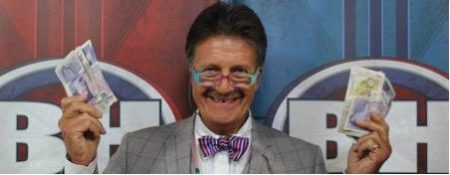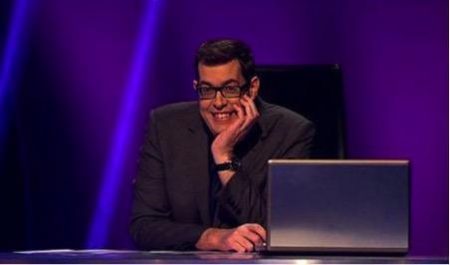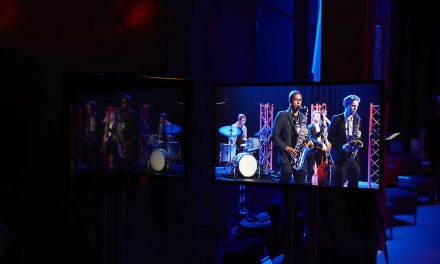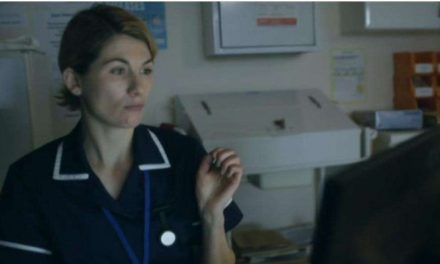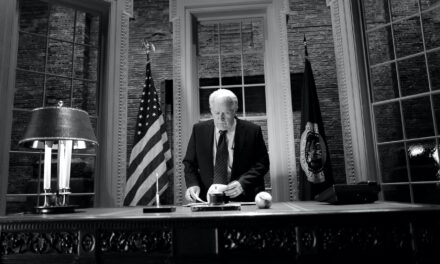The broadcast schedule has been much on my mind of late – and not just because, at the time of writing, it has recently experienced two disruptions: one comparatively minor, and the other guaranteed to send shockwaves down the spines of all ITV daytime viewers. Firstly, last Friday’s episode of Have I Got News for You (BBC, 1990- ) was unceremoniously dropped just twenty minutes before it was due to air because Change UK’s Heidi Allen was one of the panellists, and the presence of a political party leader in the run-up to the European elections would have breached editorial guidelines (though Allen was quick to point out that the same logic was not applied to Nigel Farage’s appearance in 2014). I was out wassailing on Friday night, but would have watched it while recuperating on Saturday morning. Then, more explosively, on Monday The Jeremy Kyle Show (ITV, 2005-2019) was pulled from the schedule entirely (and all episodes removed from ITV Hub) following the death of Steven Dymond, who had recorded an appearance on the show a week previously. After a brief period of debate, the show’s cancellation has literally been announced as I write.
These disruptions point to the importance that the broadcast schedule continues to play in everyday life, despite the extent to which it is now interwoven with online TV (for more on which, see Cathy Johnson’s latest book). Back in 2015, when I moved to Salford[1] to take up a full-time post, I wrote a blog called Saved by the Schedule. This was intended to convey the extent to which broadcast television lent a reassuring sense of structure to an otherwise unsettled period, during which I was obliged to spend my evenings in cheap hotels until more permanent accommodation became available. As I munched through the takeaway of the day, I found myself reliant upon whatever familiar shows I could locate on Freeview in order to provide some form of homeliness in a place (and to a lifestyle) with which I was not yet at home.
Happily, my domestic life is now more settled, and though I continue to make use of various iPlayers and a PVR, not to mention a veritable mountain of DVDs and BluRays, the schedule still plays a large part in my routine – perhaps even more so in recent months, when I have been away from the workplace on research sabbatical. This has been an extremely happy and productive period – rather like doing a very short PhD, only this time with an income[2] – and on those days where I have worked from home, the TV schedule has been, in the words of Homer,[3] a friend, teacher and secret lover.
Well, perhaps not the last one.
I generally rise early in order to catch up on emails, a task I perform in my study (yes, I have a study now). Before I do this, though, I generally switch on the TV in the living room. The TiVo (other PVRs are of course available) will already be tuned to BBC One HD from the night before (I usually turn in after watching the ten o’clock news). The resultant strains of Breakfast (BBC, 2000- ), while audible, are not distracting; when one lives alone, the sound of background chatter can be quite comforting.
Emails dealt with (and it’s soooooooooooo nice not having students writing to ask me what readings they should be doing in order to get a First, or whether the reference list is included in the essay word count, of if it’s OK to bunk off my classes because they have arranged some work experience instead), I will start on the making of breakfast. While the kettle is boiling and the toast toasting, I return to the living room, erect the ironing board, and plug in the iron (laundry will have been hung out to dry in the study overnight). I then return to the kitchen to make the tea and spread the Marmite, before carrying the results through to the living room (I do have a breakfast bar in the kitchen, but don’t use it that often). I will partake of this repast in between my ironing activities, all the while listening to what is unfolding on-screen. Note that I write ‘listening’ rather than ‘watching’; while I don’t entirely buy into the ‘gaze/glance’ model (Ellis, 1982), my eyes will not be 100% glued to the screen while I am operating an extremely hot electrical appliance. I know roughly what day it is as I perform my chores because Breakfast has a set running order for its presenters: on Mondays to Wednesdays, Louise Minchin and Dan Walker are in the chair, while Charlie Stayt and Naga Munchetty usually take over on Thursdays and Fridays. This line-up is not always entirely stable, by which I do not mean that the presenters are in any way volatile or erratic (though we’ll come back to Walker shortly); however, they do sometimes have time off for good behaviour. The big four are complemented (and frequently complimented, in on-screen banter) by a roster that includes Steph McGovern (now showing signs of spreading her wings after twice hosting HIGNFY), Carol Kirkwood, Matt Taylor, Sally Nugent, Jon Kay and Mike Bushell (who I think looks a bit like John F. Kennedy). These luminaries deal variously with business, weather and sport, but will fill in as a main presenter should the need arise. Any significant change in the line-up, while providing the thrill of the new, also has the potential for disruption. It is sometimes the case that none of the familiar faces are in attendance – usually on a Saturday morning, when there is very much a sense of the players from the substitute bench being given a shot at the premier league. It can also be unsettling on weekdays when the classic pairings are for some reason mixed and matched, which risks distorting the established on-screen chemistry. Take, for example, Louise, who represents everyone’s favourite cheery auntie and provides a steadying presence for over-keen sixth former Dan; the vaguely irritating cousin who acts as though he knows it all, but really doesn’t. I mean, I know he went up Mount Kilimanjaro for Comic Relief, which is entirely praiseworthy, but he then spoiled it all by coming back down again.[4] Louise just about keeps Dan, who is at his most comfortable talking about football, in check. While I would hesitate to describe him as gauche,[5] he does have a tendency seemingly to say the first thing that comes into his head – not unlike a junior Alan Partridge. Take this morning (Wednesday). This week, Breakfast has been discussing issues relating to the menopause. On Monday there was a pre-record featuring Louise, Naga, Carole and Sally, in which they exchanged their observations and personal experiences; the response from viewers has been overwhelmingly positive. Then on Tuesday Louise offered a considered solo reflection on what the menopause had meant in terms of her relationship with her family. This series has been titled ‘Wake Up to the Menopause’, and today Dan jauntily announced: ‘Hello! Today we’re waking up to the menopause. Well, not all of us, obviously,’ and then smirked, presumably at the thought that anyone might think he was undergoing the change personally. Louise, who is well used to this sort of thing by now, simply looked at the camera, laughed (somewhat despairingly), and shook her head.
It would have been a very different story had Naga been there.
Naga was paired with Dan when he first replaced the wonderful Bill Turnbull in 2016, and the transition did not look smooth from where I was standing.[6] Although the situation has since visibly mellowed, at first Naga treated Dan like the little brother who was allowed to stay up later than she had at his age. If Naga had been co-hosting with Dan today, he would first have received THE LOOK (where Naga turns her head ninety degrees clockwise to stare at him, directly and accusingly, leaving her face in profile), followed by THE SILENCE (where the unspoken question ‘What on earth do you think you’re playing at?’ hangs in the air like a big, threatening bird of prey).
So, it’s probably best that she isn’t on until Thursday, when – all things being equal – she will again be paired with Charlie, who I now believe secretly revels in his position as elder statesman (Staytsman?) of the red sofa. This relationship offers a completely different dynamic to Louise and Dan; Naga enjoys teasing Charlie (usually about his hair, or his age), and we enjoy watching her do so. I have a lot of time for Charlie; we sometimes travel up on the same train from London to Manchester on a Wednesday. We don’t actually talk to each other or anything, but we both like to be first out of the carriage (the trick is to vacate your seat as soon as the train leaves Stockport, and swiftly make your way to the front exit). Although he tries a little too hard to get politicians on the ropes when interviewing (a trait he shares with Andrew Marr, whose show forms the bedrock of my breakfast routine on a Sunday), Charlie has had some genuinely inspired moments. Who can forget his impromptu duet on ‘Some Enchanted Evening’ with Jeff Goldblum, when the latter was supposed to be promoting Jurassic World 2? You simply don’t get that quality of experience with Piers Morgan. Come to think of it, I don’t think I would be comfortable referring to Mr Morgan by his Christian name the way I do with the BBC team. Young Dan may put his foot in it from time to time, but he’s still an important part of my day.
Well, my Monday, Tuesday and Wednesday, anyway.
So, that’s how I begin the day. By the time Breakfast finishes at 9.15 I will have done the dishes, shaved, brushed my teeth, showered, dressed, and set about my work. The television set will remain switched off until a little after 12.30, when I will again tune in to catch the second half of Bargain Hunt (BBC, 2000- ) while I prepare and consume my lunch.
Now, I seldom watch a whole episode of Bargain Hunt, but if you tune in at this time (it starts at 12.15) you may well catch the tail-end of the purchases, should be able to see whatever local historical interest featurette they have tacked on for the day, and will certainly catch the auctioneer’s opinion of the teams’ purchases, plus the thrill of the final auction (which should be pronounced ‘ock-shun,’ as if you didn’t know) itself.
For those unfamiliar with Bargain Hunt, it is a 45-minute show that features two competing pairs, conveniently colour-coded as The Red Team and The Blue Team. Each of these is given an ‘expert’ to guide them in the purchase of three items at an antiques fair, for which they are given £300 and allocated just one hour. These items will then be sold at auction, and whichever team achieves the largest overall profit (or the smallest loss) is declared the winner. There, are however, no losers in Bargain Hunt – just runners-up (an admirable philosophy), and if both teams make a profit, they each get to take their winnings home. Any team that makes a profit on all their items is also awarded a ‘golden gavel’: a small pin badge that signifies their achievement to anyone in the know (‘Wear it with pride!’).
It’s all good fun. I first came across the programme in the early 2000s, when it was helmed by the original presenter, perma-tanned David Dickinson, whose catchphrases were ‘What a bobby-dazzler!’ and ‘Cheap as chips!’ As I was freelancing in those days I often had more free time during the day, and used to watch it with my grandmother when I went to visit. The point about daytime TV of this kind is that it is reassuringly unchanging; it provides a fixed point of familiarity, which makes it all the more remarkable when something truly memorable does happen on the show, such as when Bez from the Happy Mondays cheated in the celebrity charity special by secretly planting his girlfriend as a bidder (Jarvis Cocker was not impressed). Such simple daytime fare was not enough for David Dickinson, however, who clearly felt that the show deserved a more prestigious place in the schedule. In 2002 the BBC took the bold decision to create a prime-time version, hosted by Dickinson, while Antiques Roadshow (BBC, 1979- ) regular Tim Wonnacott took over for the daytime editions. I watched both, and I have to say that Bargain Hunt just didn’t have what it took to make it in prime-time, despite increasing the float to £500. Perhaps I was too familiar with the format, but what functioned perfectly well as a leisurely, good-natured daytime contest that nobody took too seriously – and which more often than not featured losses instead of gains – lacked the bite required for the more competitive 8 pm slot. Daytime TV’s viewers will pretty much watch every or any day, give or take; evening viewers needed something remarkable to keep them coming back on a weekly basis, even in the early 2000s. Bargain Hunt was just too cosy and safe; that’s the whole point of it. The evening version was scrapped in 2005, after which Dickinson upped sticks to ITV and Dickinson’s Real Deal (ITV, 2006- ), never to be heard of again (unless you watch ITV daytime, which I don’t).
Such is the price of hubris…
Following Dickinson’s Icarus-like departure, Wonnacott became Bargain Hunt’s paterfamilias proper, his gap-toothed grin frequently conjuring up the ghost of Terry-Thomas.[7] During his reign there were slight tweaks the formula with the introduction of the ‘swap rule’, wherein each team expert could now purchase an item of their own, for which the Reds or Blues might swap one of their items at auction. In 2006 this morphed into the ‘bonus buy’, in which the expert takes whatever is left of the original £300 and spends it on an item of their choice. The teams are presented with this before the auction, and are thus given the time to decide whether they want to ‘go with it’ as an addition to their own purchases or not. The bonus buy has been known to turn a debit into a credit, though on other occasions (as when the auction room attendees are a little sluggish, which happens quite often) it merely compounds an existing loss.
Well, it’s only a game, isn’t it?
Such innovations have been few and far between, however; daytime TV is not a genre that thrives on change. With this in mind, Bargain Hunt did well to survive the departure in late 2015 of Tim Wonnacott. This transition was managed quite skilfully, the programme makers adopting HIGNFY’s tactic of rotating presenters; something they had already trialled the previous year while Wonnacott was competing on Strictly Come Dancing (BBC, 2004- ). These new episodes were interspersed in the schedule with those Wonnacott had filmed prior to his departure, and eventually with some of his older shows. The resulting effect was that the impact of a potentially damaging change in presenter was significantly ameliorated, as familiar faces like Thomas Forrester, Christina Trevanion, Natasha Raskin, Charlie Ross, Anita Manning and Eric Knowles – all of whom had previously appeared as experts – stepped into the breach. If anything, this added a welcome air of unpredictability to events, which continues to the present day. Even when a viewer’s ‘favourite’ is not presenting, the chances are they will be present as an expert in one of the ‘old’ shows, or will crop up as the auctioneer when the programme visits their workplace, thus presenting them in an alternative context. More than three years after he left, Tim Wonnacott’s episodes still crop up on a semi-regular basis, so there’s something for everyone.[8]
However, while I have been on sabbatical I have to say that there has been a notable element of change for change’s sake – and the new innovations have provoked the ire of regular Bargain Hunt viewers (myself included, even if I only watch the second half). Firstly, each team is now presented with a ‘challenge’ that they must fulfil as part of their purchases. Presumably this could range from ‘Buy an item of Spode pottery’ to ‘Don’t come back with a load of old tat.’ Until now, the Reds and Blues have had carte blanche to exercise their personal taste (or lack thereof) while choosing their wares; now they are constrained to purchase something that they might otherwise have ignored.
This is a shame, but is not the end of the world.
Secondly, the teams are now obliged to spend at least £75 on one of their items. This means that the chance of making a serious profit at auction (these are retail prices, after all), which is already low, is now significantly reduced.
This is also a shame, as one of the joys of the show is the one in a hundred possibility that the contestants will walk away with a substantial wad of cash. Another pleasure is watching particularly tight-fisted pairs refuse to part with more than a tenner on any one item, because they think this will guarantee them a small but safe profit.
I believe the show could have survived the introduction of one or the other of these new elements without suffering a serious drop-off in popularity. However, other adjustments – mainly cosmetic – have also taken place. Whereas in the past the experts would simply tell the teams how much time they had remaining during the initial saleroom rummaging, now they are shown to consult a teenage runner, who darts breathlessly into shot to reveal that there are only five minutes left to find something in the Deco style, before disappearing again with equal dispatch. This is presumably intended to introduce a stronger sense of jeopardy – the clock ticking away relentlessly – but is in fact just irritating. In addition, whereas previously the bonus buy would be revealed to the teams in advance of the auction – and would be subject to the auctioneer’s scrutiny (always my favourite part of the show) along with their own items – it is now sprung on them at the auction itself, after their own items have been sold. The audience is then forced to wait until the final reveal of the scores to discover – along with the contestants – whether the bonus buy made them any money or not, as they watch a recording of the latter part of the auction on a tablet.
Why?
If the underlying purpose of these changes was to inject a sense of adrenalin, tension or energy into proceedings, it is, alas, misconceived. Bargain Hunt isn’t about tension – the auction segments are usually over in a flash, which is what makes them such fun to watch – and there’s energy enough when the Reds or Blues have to go dashing back to the stall on the opposite side of the fair for the item they decided to put on the back-burner 55 minutes earlier, hoping desperately that it hasn’t been sold in the interim.
I personally spluttered with indignation the first time Eric Knowles outlined the new rules (though I don’t blame him personally), and promised myself I would write an outraged letter to the Radio Times. I didn’t, of course, but many others did, and the 30 March-5 April Feedback section kicked off with no fewer than seven angry missives, Dr John Burscough’s pithy ‘If it’s not baroque, don’t fix it’ (p. 158) winning him the Letter of the Week. The BBC smugly responded that these changes were introduced to keep the show ‘fresh and relevant’ for audiences (ibid).
Good job, Auntie Beeb.
Fortunately, these ‘new’ episodes are still being screened alongside those that follow the ‘classic’ format, and I have a feeling they will receive progressively less rotation as time passes.
Reading this back, I seem to have taken a slightly obsessive attitude towards what is after all a bit of daytime filler that I watch while making and consuming my cheese on toast, but these programmes are all about familiarity and reassurance – which is the very essence of the BBC’s daytime schedule. Not for Auntie the now-banished rantings and ravings of Mr Kyle and company; it’s all about companionship and calm. When the not very high-octane excitement of the auction is over, the two teams applaud each others’ achievements (or not), and then Eric, Charlie, Anita or Natasha lead us in the sole can-can kick that signifies the end of the show (‘So, why not join us next time for more bargain hunting? Yes? Yes!’). I can then return to my labours, safe in the knowledge that all is well in the universe.
Depending on how well the work progresses, the TV may be back on in time for the first round of Pointless (BBC, 2009- ), or it may not. It will be a poor day’s labour indeed if I am not watching by the time the head-to-head round starts. I have written before about the celebrity version of the show, but the main weekday programme has now been on air for an incredible ten years. My brother and I attended an early recording session at dear old Television Centre, and to be honest we didn’t think then that it had the legs for such a lengthy run. As you may be aware, they usually record two episodes back-to-back, and what with re-takes and breaks in recording, the time can drag somewhat. My brother has also pointed out that the classic ‘bantz’ between host Alexander ‘Xander’ Armstrong and his assistant, Endemol producer and Brobdingnagian Richard Osman (not Osmond), which now forms one of the major pleasures of the show, was less pronounced in the early days, despite the fact that they were (I believe) already friends. At that point Richard was still pretending that the prop laptop on his desk was actually providing him with information – a conceit that has long since been abandoned.
Like Bargain Hunt, Pointless has experienced minor tweaks since it was first introduced, but these have not seriously affected the basic formula. The most notable change came when the set was redecorated the series before last, to incorporate little rotating hexagons of lights in the background; these became the cause of much comment from Xander and Richard. The programme’s popularity is indicated by the fact that it was moved from BBC Two to the main channel after just three years, and has provided the lead-up to the six o’clock news for as long as I can remember.
Like any good genre chow, Pointless places a novel spin on the traditional set-up in that, while the contestants (four pairs, who have to swap places in the first two rounds to answer a question apiece without consulting their partner) still have to give responses that are correct, the aim is to score as few points as possible. Each question has already been posed to a sample of one hundred members of the public, so the more obvious the answer, the greater the number of points it will score (if ninety out of the hundred people questioned were able to name A Hard Day’s Night as a Beatles album, that answer will score the contestant ninety points). The lowest possible score is zero, which is a Pointless answer and adds £250 to the overall jackpot.
Get it?
This is a neat approach, as it tests not only the contestants’ own knowledge, but also their estimation of how ignorant the general populace is (and I don’t know whether you have noticed, but people are growing increasingly ignorant). Demographic factors are also at play in terms of the hundred people sampled; how do we know what the age composition was, for example? That might seriously influence the answers given with regard to popular culture questions. In addition, the presence of one expert among the sample can also skew the odds, which is potentially bad news in the final, where the remaining pair is aiming for a Pointless jackpot in order to win the lolly. Most people may not be able to name Patrick Troughton as one of the cast of The Omen (1976), but on yesterday’s show I and just one other person did – so no jackpot if you gave that answer (which they didn’t).
Thus, a surprisingly simple format keeps everyone on their toes – and if things do get boring, we can always rely on Richard and Xander to jolly things along. In recent episodes they have taken to using pithy rhyming sound-bites to explain the rules before round one, in order to save time (‘High score, out the door!). However, they then proceed to waste the time they have just saved by explaining at some length the rationale behind this new approach.
The show thrives on repetition and familiarity, and provides plenty of opportunity for para-social interaction. My father and I often shout answers, unheeded, at the celebrity contestants if I visit on a Saturday; celebs generally tend to know less than ‘ordinary’ members of the public, though Shaun Williamson (Barry from EastEnders (BBC, 1985- )) is extremely erudite. Yesterday I grew quite irate when a finalist named John Travolta as having appeared in The Exorcist (1973) (he was in Carrie (1976)), and whenever Richard turns to the camera and says ‘Very well done if you got that one at home,’ I always respond ‘Thanks, Richard.’
Even if I didn’t get the answer right.
Many a friend and colleague have enquired whether I would like to apply to compete on Pointless, but my fear of public humiliation has always held me back. I think I’d be OK on questions about Doctor Who (BBC, 1963-1989) or the Kinks, but if they asked about football or geography I would be in serious trouble (and remember you cannot confer with your partner until the head-to-head). What if my brain froze (as it is wont to do) when given a lovely lateral definition like ‘Splendid seat covered in carpets’?[9] My students would have a field day if I scored a hundred; I could never hold my head high in the lecture theatre again. So, for the moment I think discretion is the better part of valour. However, having watched a ridiculous number of episodes over the years (some more than once; as with most daytime telly, there is a lot of recycling), I am prepared to offer Richie’s Top Tips of Pointless Etiquette to help aspiring contestants come off a little better should they decide to compete:
- When, at the start of round one, Xander asks you what you do, do not begin your response with the word ‘So’, e.g. ‘So, I’m a university lecturer.’ ‘So’ in this context is an ice-breaker, as in ‘So, what do you do for a living?’ If Xander has already posed the question, your ‘So’ is redundant. Just say ‘I’m a university lecturer.’ Keep it simple.
- When Xander asks you who your partner is, do not say ‘She’s a work colleague.’ If a colleague can be defined as someone with whom you work, is it really necessary to use the word ‘work’? Surely it is better just to explain that she is a colleague? It is of course possible that this is a colleague from another university – someone in the same profession as you, but with whom you do not actually work in an office on a regular basis – but how likely is that? Again: keep it simple.
- If you get the answer right, do not applaud yourself when the audience does. It looks really bad. It’s fine to applaud your partner when they get one right – ideally, you should half-turn towards them on the podium, smile, make eye contact, and maybe nod encouragingly. But do not clap yourself. It’s just wrong.
- If you make it to the head-to-head, whatever the outcome please ensure you shake hands with both of the other contestants at the end. The producers will cut to it in the edit, so don’t wait for the other pair to come to you; it looks complacent. And absolutely do not stand there with your arms dangling at your sides, no matter how devastated or dazed you are feeling.
- When Xander and Richard are conducting classic banter, make sure you respond appropriately. Laugh – or at least smile – even if you don’t find what they are saying particularly amusing. The camera will cut back to the contestants for a reaction shot at some point, and if you are stood there like a straight-faced lemon, you will appear humourless and dull, even though you are probably quite charming, and you will lose the audience at home’s sympathy.
Follow these recommendations and, while you may not win, you will at least come across as a good egg.
Pointless provides a certain sense of continuity across the week in that those contestants who do not win come back for another attempt in the following episode, but this is not a show to binge-view; Netflix are unlikely to acquire it any time soon. I once tried to watch a couple of episodes back-to-back on catch-up, and rapidly became seriously disorientated. Like the other shows examined here, Pointless is pure daytime schedule; it is a fixed and familiar point in one’s routine, and that is what I (and many others, judging from its longevity) enjoy about it. When it ends at 6 pm, it is time to take one last look at the email account, and then to attempt to switch off for the rest of the day (mentally, that is). Move or (worse) remove Pointless from the schedule, and I am bereft; I fear and resent the Wimbledon season for this very reason. Why don’t they put the tennis stuff on BBC Four, so that people who like it can tune in all day to their hearts’ content, and the rest of us can cling to reassuring normality?
Dan Walker could present.
So, there you have it. Even in the era of online telly and multiple platforms, the broadcast schedule continues to shape my daily routine, at least. The fevered speculation regarding what will replace The Jeremy Kyle Show (I believe the gap has temporarily been filled by Dickinson’s Real Deal; nice to see David back in the big time) indicates that the schedule still matters to the British public.
Let’s hope it doesn’t go anywhere soon.
Dr Richard Hewett is Lecturer in Media Theory at the University of Salford. He has contributed articles to The Journal of British Cinema and Television, The Historical Journal of Film, Radio and Television, Critical Studies in Television and Adaptation. His book, The Changing Spaces of Television Acting: From Studio Realism to Location Realism in BBC Television Drama, was published in 2017; a paperback version will be available in 2020.
Footnotes:
[1] I have since moved back, but I can tell you about that another time.
[2] Unlike some of the colleagues I have spoken to, I genuinely enjoyed my PhD.
[3] Simpson.
[4] I know, I know; he does a lot of good work for charity; I am just being facetious.
[5] But not for long.
[6] I was doing the ironing, remember.
[7] Not literally.
[8] Dickinson, however, is never spoken of – which is a shame, because without him I doubt the show would have got off the ground in the early 2000s.
[9] It’s a sofa.



